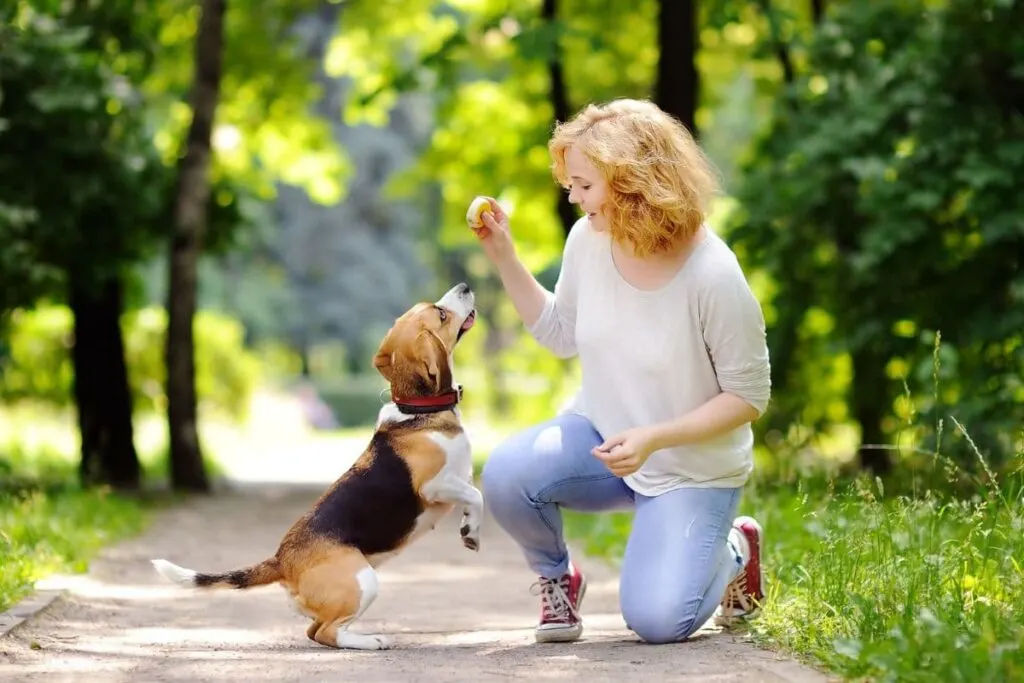As much as you love your dog, barking can be annoying, and too much barking doesn’t only negatively affect you and your neighbors but your dog as well.
Dogs can get a sore throat from barking too much, so it’s important to stop excessive barking as soon as possible by figuring out the reason for your dog’s barking, such as stress or anxiety.
The rest of this article will cover everything you need to know about sore throats in dogs, why your dog won’t be quiet, and how to prevent excessive barking in the first place.

How To Treat Your Dog’s Sore Throat
Not only can constant barking lead to your dog developing a sore throat, but it can also result in laryngitis — a painful inflammation of the part of the throat known as the larynx.
As such, treating a sore throat as soon as you notice it is vital.
Symptoms of a sore throat in dogs include:
- Hoarse barking, especially if the hoarseness increases while your dog is barking.
- A hoarse or dry cough.
- Licking lips or pawing at their face.
- Trouble swallowing.
- Whining when opening their mouth, even if they’re only yawning.
As with any time your dog is acting off, scheduling a vet appointment is a good idea.
However, you can try some at-home treatments, especially if the sore throat hasn’t been going on for a long time:
- Give your dog soft or canned dog food. Like soup when humans have a sore throat, switching your dog to softer foods is easier on their aggravated throats and easier to swallow.
- Increase the humidity in the house.
- Make sure your dog drinks plenty of water.
- Remove their collar.
The following few treatments require a bit more care and attention to dosages but are still options:
- Honey: You can give 0.5-1 teaspoon (2.5-4.9 mL) to adult dogs three times a day.
- Coconut oil: An appropriate amount is 1 teaspoon (4.9 mL) for every 10 lbs (4.5 kg) of your dog’s weight. This should be spread out over the whole day.
- Cough syrup: Ensure it’s canine-safe cough syrup.
- Some herbal teas: Teas such as peppermint are good, but always consult your vet.
You shouldn’t give aspirin to your dog, and if you have concerns about whether something is safe to give your pet, contact your vet.
In most cases, your dog’s throat will take a few days to heal, but not longer than a week.
Are There Other Reasons Why It’s Bad for Your Dog To Bark Excessively?
A sore throat isn’t the only problem that can come from excessive barking, particularly if the cause is stress-related.
Barking can lead to a positive feedback cycle in your dog — the more they bark, the harder it will be to calm them down.
The longer it takes for your dog to calm down, the longer it will bark.
The pain of a sore throat can only add to this cycle, as the pain causes stress, which in turn leads to more barking.
Too much barking can lead to additional problematic behaviors, such as pacing, digging, and picking fights.
Reasons Why Your Dog Is Barking So Much
Barking is one of a dog’s primary ways to communicate, and short, occasional barks are to be expected.
However, when the barking becomes excessive, it’s critical to figure out the reason behind the behavior.
Here are some of the main reasons dogs bark too much:

- Stress. This can be caused by multiple things, from strangers inside or outside the house, the presence of other animals, or being scared.
- Attention. Dogs will bark to get their owner’s attention if they want something or are bored.
- Too much energy.
- Separation anxiety.
- Your dog is trying to alert you to something.
Excessive barking, when paired with other symptoms like fever and drooling, can also indicate that your dog is in pain or there’s another health concern, in which case you should take your pet to the vet.
How To Get Your Dog To Bark Less
Once you have identified the cause of your dog’s barking, then you can start on a solution.
For example, if your dog is barking excessively because of anxiety, consider crating them when you leave the house.
A small, safe space, like a crate, will help your dog calm down.
You also shouldn’t leave your dog alone in the yard, especially if they’re prone to barking at wildlife or people walking nearby.
Training is also essential, and teaching your dog the “quiet” and “speak” commands will let your dog learn when it’s appropriate to bark:
- Start with the “quiet” order by creating controlled situations to get your dog to bark.
- After stopping the situation, return to your dog and wait for them to calm down.
- Once they’ve stopped barking, say “quiet” and give them a treat.
Once your dog regularly listens to “quiet,” you can add in the “speak” training. This is done by saying “speak” in a positive tone when your dog is barking and giving them a treat.
Practice and repeat the quiet and speak orders, so they remain fresh in your dog’s memory.
Making sure that your dog gets plenty of exercise — mental and physical — each day can go a long way in preventing excessive barking from boredom or extra energy.
If you find your dog is barking because they want you to do something, such as food, don’t give them the desired item or action until they stop, as you don’t want them to associate barking a lot with getting what they want.
You can also try having your dog put on a sweater.
I have an article discussing how sweaters can calm down dogs. [Why Does a Sweater Calm Your Dog Down?]
You should definitely check it out to figure out the right kind of sweater for your dog to help them stay calm, and ergo, bark less.
How To Stop Your Dog From Barking in the Moment
When your dog is barking non-stop, one of the worst things you can do is yell at them to stop.
Instead, distract your pet or remove the trigger if possible.
Options include closing the blinds, adding background noise, or changing your schedule so your dog isn’t left alone for long periods.
Do Some Dogs Bark Less Than Others?
While all dogs bark, some breeds are less vocal than others, and you may want to consider that when adopting a canine friend.
Dogs that tend to bark less include:

- Basenji
- Great Dane
- Shiba Inu
- Bulldogs
- Mastiffs
On the other hand, well-known barkers include breeds like Beagles, Pomeranians, and German Shepherds.
Conclusion
Excessive barking is usually due to stress, anxiety, or boredom and can lead to your dog developing a sore throat.
If you notice symptoms such as trouble swallowing, hoarseness, or pained whining when your dog opens their mouth, switch them to a softer food, make sure they drink lots of water and consider treatments like small amounts of honey or cough syrup.
When your dog is barking, remember to not yell at them and focus on figuring out the cause, as well as taking preventative measures like basic training of the “quiet” and “speak” commands.
